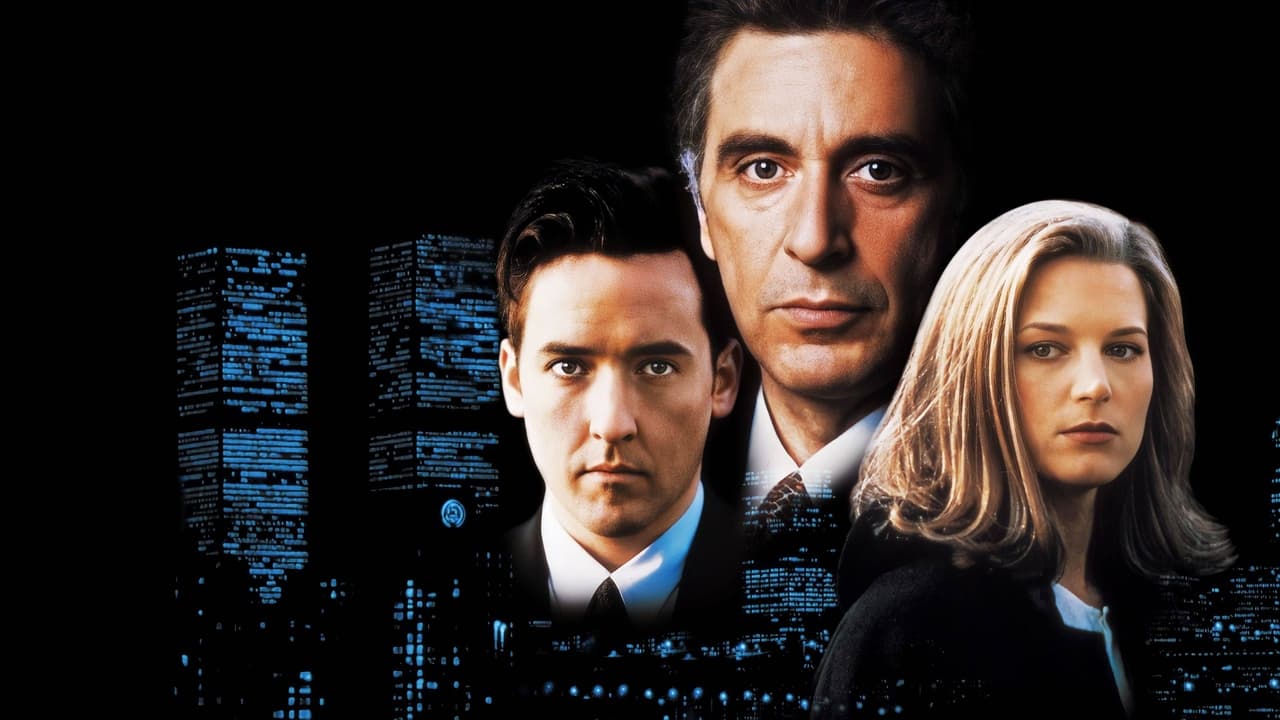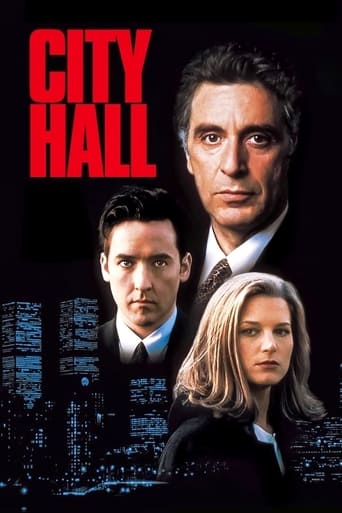UnowPriceless
hyped garbage
Contentar
Best movie of this year hands down!
Invaderbank
The film creates a perfect balance between action and depth of basic needs, in the midst of an infertile atmosphere.
Mehdi Hoffman
There's a more than satisfactory amount of boom-boom in the movie's trim running time.
zakfar2000
Well, I will say this is the worst movie of Al Pacino, and this is not his mistake. I don't really know what the director was thinking while making the movie. If you have to make it a political drama, make one. But if you have to make it a murder mystery, than have it like that. I don't really know why people liked this movie so much (giving it 6 and 7 Rating, as it does not deserve it). This is simply a waste of time. People who want to watch the Political Dramas, they are well aware of the fact that the Politicians are far more intelligent than the ones shown in the story. And if they do bad things, they don't simply give up so easily. Everyone seemed to know what was happening, and no one seemed to react it. How come some one be so neglecting to incoming danger? It is natural for people having power to find the negative ways, and solve the issues, especially when they have already done something negative. It looks like they were all waiting for the climax to just pop up, and then say... 'Ah! What the..." For some reasons, the climax seemed to be obvious since the middle of the movie.3/10 only for Al Pacino. I really liked the way he delivered his Passionate speeches. I won't say it was a completely boring movie, but many people won't enjoy it. I only did because of being Al-Pacino Frenzy.
wes-connors
Idealistic Louisiana-born John Cusack (as Kevin Calhoun) moves to New York City, where he impresses up-and-coming politician Al Pacino (as John Pappas) enough to become the Mayor's right hand man. The story begins with a shoot-out in Brooklyn, involving a gangster drug dealer and "off-duty" policeman. Unfortunately, an innocent six-year-old boy is shot dead in their crossfire. Naturally, this arouses a heightened interest in justice from the press, police, and public. Mayor Pacino tries to manage the unfolding drama with an eye on keeping his and Gotham City's reputation intact; he is considering a run for the White House, and is bidding on the upcoming Democratic Convention.Deputy Mayor Cusack joins the investigation, on his mentor's behalf. Pretty Bridget Fonda (as Marybeth Cogan) is added to up the feminine quotient, obviously; following one of the story's funerals, she and Cusack have a great car scene. Singing Rogers and Hammerstein songs, Danny Aiello (as Frank Anselmo) leads a terrific supporting cast. "City Hall" is so predictable, reviewers and studio publicity (like the DVD sleeve description) routinely hint at the film's big revelation; it was suppose to unravel slowly, but is painfully obvious too early on - in fact, the film's events, except for the opening boy's death, feel like a well-worn old pair of shoes. But, they are comfortable and fit nice.******* City Hall (2/16/96) Harold Becker ~ John Cusack, Al Pacino, Bridget Fonda, Danny Aiello
jzappa
Working from a script written in part by Nicholas Pileggi, best known for writing the book Wiseguy, which he adapted into the movie Goodfellas, and for writing the book and screenplay Casino, director Harold Becker shows how connected circles scratch each other's backs, even in the command of a comparatively honorable mayor like Pappas, who is regarded as a presidential prospect. As Cusack follows the paper trail of the dead mobster's probation report, his skepticism is agitated. How did this violent young man get probation rather than a jail sentence? We meet the other players in the plot, not the least of which is Danny Aiello, the political boss of Brooklyn, and Tony Franciosa, the Mafia boss whose nephew was shot dead. How and why these people are affiliated I leave to the movie to divulge, though there are never any misgivings that they are.The narrative is told generally through the eyes of the Cusack character, a visionary from Louisiana who admires his boss and hopes to learn from him. Much is made by everyone of bureaucratic knowledge passed down through the generations. Some of the dialogue is ungracefully erudite, but considering I just described the building blocks of the story as bureaucratic knowledge, one can't say it doesn't work. The shooting case builds against the seasoning of two other issues on the mayor's desk: a charge by Aiello for a subway stop and an off-ramp in Brooklyn to aid a new banking center, and the city's bid for the next Democratic convention. Individual idiosyncrasies are also explored, including Aiello's emotional bond with the music of Rogers and Hammerstein.Much also is made of menschkeit, a Yiddish expression, which, Pappas explains to his deputy, is about the bond of honor between two men, about what happens between the two hands in a handshake. This connection doesn't mean much to Bridget Fonda, the lawyer for the policeman's association who defends the dead cop's honor and fights for his widow's pension even as incriminating evidence appears. Little by little, the deputy mayor comes to grasp that menschkeit is such an influential notion that it outclasses he law.There are various scenes of hard impact, including one where the Brooklyn boss comes home for lunch in the middle of the day, his wife asserts her interest through the medium of the dish she has cooked, and then the Mafia boss drops in by surprise. There is also a compelling, and markedly conjectural, late scene between the mayor and his deputy.One scene handled with delicacy is comprised of the mayor's decision to speak at the funeral of the slain child, in a Harlem church. His advisers tell him he won't be wanted there. But he goes anyway, and cranks himself up for a spiel of unabashed hyperbole, Pacino and his character both.It gets an impressive reaction from the congregation, but the mayor knows, and his deputy knows, that it was artificial, and the way they scrupulously evade discussing it, in the limousine taking them away, is a subtle employment of composure and innuendo. This is a script that knows it has to supply Pacino with the reason why most of his fans go to see him, and immediately follows its quota with the reality that silence has much more inherent meaning than speech.Pacino and Cusack are convincing together throughout the movie, the older man unbreakable and aware, the younger one anxious to learn, but with ideals that don't sway. Pacino is innate with his down-to-earth capacity to marry common sense and inventive imagination, inspired flair and matter-of-fact realism. Cusack moves very freely in spite of his dark defensiveness.The Bridget Fonda subplot development is unnecessary, but it is a result of veteran screenwriter Paul Schrader's otherwise shrewdly perceptive belief in the worth of every character, and each is fleshed into earnest embodiments. Aiello, for instance, is a highlight because he evokes his character's joie de vivre and sensitivity to his environment.
jbmarcy
Admittedly, I find Al Pacino to be a guilty pleasure. He was a fine actor until Scent of a Woman, where he apparently overdosed on himself irreparably. I hoped this film, of which I'd heard almost nothing growing up, would be a nice little gem. An overlooked, ahead-of-its-time, intelligent and engaging city-political thriller. It's not.City Hall is a movie that clouds its plot with so many characters, names, and "realistic" citywide issues, that for a while you think its a plot in scope so broad and implicating, that once you find out the truth, it will blow your mind. In truth, however, these subplots and digressions result ultimately in fairly tame and very familiar urban story trademarks such as Corruption of Power, Two-Faced Politicians, Mafia with Police ties, etc. And theoretically, this setup allows for some thrilling tension, the fear that none of the characters are safe, and anything could happen! But again, it really doesn't.Unfortunately, the only things that happen are quite predictable, and we're left with several "confession" monologues, that are meant as a whole to form modern a fable of sorts, a lesson in the moral ambiguity of the "real world" of politics and society. But after 110 minutes of names and missing reports and a spider-web of lies and cover-ups, the audience is usually treated to a somewhat satisfying reveal. I don't think we're left with that in City Hall, and while it's a very full film, I don't find it altogether rich.

